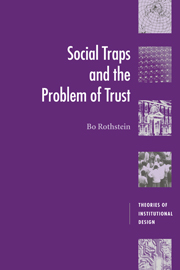Book contents
- Frontmatter
- Contents
- List of tables and figures
- Acknowledgements
- 1 Reflections after a long day in Moscow
- 2 On the rational choice of culture
- 3 On the theory and practice of social capital
- 4 Social capital in the social democratic welfare state
- 5 How is social capital produced?
- 6 The problem of institutional credibility
- 7 Trust and collective memories
- 8 The transition from mistrust to trust
- 9 The conditions of trust and the capacity for dialog
- Bibliography
- Index
5 - How is social capital produced?
Published online by Cambridge University Press: 22 September 2009
- Frontmatter
- Contents
- List of tables and figures
- Acknowledgements
- 1 Reflections after a long day in Moscow
- 2 On the rational choice of culture
- 3 On the theory and practice of social capital
- 4 Social capital in the social democratic welfare state
- 5 How is social capital produced?
- 6 The problem of institutional credibility
- 7 Trust and collective memories
- 8 The transition from mistrust to trust
- 9 The conditions of trust and the capacity for dialog
- Bibliography
- Index
Summary
If social capital really has all the advantages evinced by the theory and the by now rather extensive empirical research, the question of how it can be produced logically follows. If social capital really is capital, how do we bring about investments? With respect to human and physical capital, the answers to the questions are rather obvious (albeit not always easy to achieve in practice), but the question is considerably more difficult to answer when it comes to social capital. For example, the response to self-proclamations of trustworthiness is to ask what is wrong with a person or an organization that feels compelled to emphasize that particular trait. Instead of producing trust, such messages usually make the recipient suspicious of the sender's intentions. We are prone to think that there is something intrinsically wrong with individuals or organizations that explicitly tell us to trust them. Unlike acquiring knowledge and making tools, the production of trust is based on complex psychological processes (Misztal 1996: 20–26).
The qualitative dimension of social capital – i.e., social trust – is according to our definition a matter of convictions (personal beliefs based partly on acquired knowledge and partly on a moral worldview). Beliefs are not easy to manufacture and they cannot be compelled into existence.
- Type
- Chapter
- Information
- Social Traps and the Problem of Trust , pp. 92 - 128Publisher: Cambridge University PressPrint publication year: 2005
- 1
- Cited by

